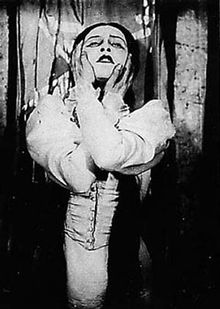Hanna Rovina
Hanna Rovina ( Hebrew חנה רובינא; born on September 15, 1889 in Berasino , Minsk Oblast , Russian Empire ; died February 3, 1980 in Tel-Aviv ) was an Israeli actress . She was one of the founders of the Habima Theater and was considered the first lady of the Israeli theater .
Life
The exact date of birth of Hanna Rovina is unclear. She celebrated her birthday on Yom Kippur according to the Jewish calendar . There are different sources for the year of birth: 1888, 1889 or 1892. She was born in what is now the Belarusian city of Berasino, her father was a supporter of the Hasidic Chabad movement. As a teenager she moved to Warsaw , where she trained as a kindergarten teacher and attended historical lectures with Jitzchak Gruenbaum . In 1917 she joined the Jewish theater studio set up by Nachum Zemach and was one of the founders of the Habima Theater, which at that time gave its first performances in Moscow using the Stanislavsky method, directed by Vakhtangov . Her prime roles were the portrayal of the bride Leah in The Dibbuk by S. An-ski and the mother of the Messiah in David Pinski's The Eternal Jew . She played these roles in Leningrad in 1925, Riga in 1926 and on subsequent Habima tours in Western Europe and the USA.
With her troupe she settled in Palestine in 1928 and was soon considered the country's leading actress. She embodied such diverse heroines as Jakob Gordin's Mirele Efros , Euripides ' Medea and Shakespeare's Cordelia , the youngest daughter in King Lear . She later turned to maternal roles, as in Karel Čapek's Mother and Brecht's Mother Courage , and played pieces by Nissim Aloni . During the Second World War she performed in front of soldiers of the Jewish Brigade in Italy and elsewhere, in the Israeli War of Independence before soldiers of the Israeli army .
With the writer Alexander Penn (1906–1972) Rovina had a daughter from an extramarital relationship; Ilana Rovina, born in 1934, later became a singer.
Hanna Rovina made high demands on herself and her audience and did not tolerate any inattentiveness. During a dramatic moment in a play about Hannah Scenes by Aharon Megged , she addressed students present in the audience and shouted, "Stop nibbling sunflower seeds!"
In 1956 she was awarded the Israel Prize . She died in Tel Aviv in 1980 and is buried in the Kiryat Shaul cemetery.
literature
- Encyclopedia Judaica , Second Edition, Volume 17, p. 501.
Individual evidence
Web links
- Hannah Rovina in the Internet Movie Database (English)
| personal data | |
|---|---|
| SURNAME | Rovina, Hanna |
| BRIEF DESCRIPTION | Israeli actress |
| DATE OF BIRTH | September 15, 1889 |
| PLACE OF BIRTH | Berasino , Minsk Oblast , Russian Empire |
| DATE OF DEATH | 3rd February 1980 |
| Place of death | Tel-Aviv |

